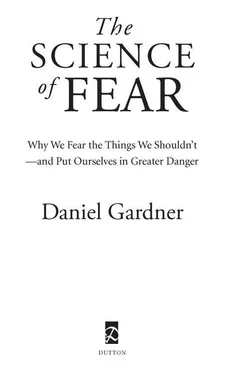Daniel Gardner - The Science of Fear
Здесь есть возможность читать онлайн «Daniel Gardner - The Science of Fear» весь текст электронной книги совершенно бесплатно (целиком полную версию без сокращений). В некоторых случаях можно слушать аудио, скачать через торрент в формате fb2 и присутствует краткое содержание. ISBN: , Издательство: Penguin Group (USA) Incorporated, Жанр: Психология, Политика, Прочая научная литература, на английском языке. Описание произведения, (предисловие) а так же отзывы посетителей доступны на портале библиотеки ЛибКат.
- Название:The Science of Fear
- Автор:
- Издательство:Penguin Group (USA) Incorporated
- Жанр:
- Год:неизвестен
- ISBN:9780525950622
- Рейтинг книги:3 / 5. Голосов: 1
-
Избранное:Добавить в избранное
- Отзывы:
-
Ваша оценка:
- 60
- 1
- 2
- 3
- 4
- 5
The Science of Fear: краткое содержание, описание и аннотация
Предлагаем к чтению аннотацию, описание, краткое содержание или предисловие (зависит от того, что написал сам автор книги «The Science of Fear»). Если вы не нашли необходимую информацию о книге — напишите в комментариях, мы постараемся отыскать её.
The Science of Fear — читать онлайн бесплатно полную книгу (весь текст) целиком
Ниже представлен текст книги, разбитый по страницам. Система сохранения места последней прочитанной страницы, позволяет с удобством читать онлайн бесплатно книгу «The Science of Fear», без необходимости каждый раз заново искать на чём Вы остановились. Поставьте закладку, и сможете в любой момент перейти на страницу, на которой закончили чтение.
Интервал:
Закладка:
266: “. . . will ‘set off a bomb that contains nuclear or biological material.’ ” The portrayal of WMDs as doomsday weapons, and the obsessive focus on them that follows, can lead even the most sophisticated thinkers to some truly bad conclusions. In November 2007, the esteemed professor of Near Eastern studies Bernard Lewis cast the fight against terrorism as the third great fight against totalitarianism, after the struggles against Naziism and Communism. But there is an important difference, Lewis wrote. The Nazis “had no weapons of mass destruction. The Soviets had them, but were deterred from using them by what came to be known as ‘mutually assured destruction.’ Our present adversaries either have or will soon have weapons of mass destruction, but for them, with their apocalyptic mind-set, mutual assured destruction would not be a deterrent; it would be an inducement. ” Thus, according to Lewis, neither a genocidal maniac who came within a hair of conquering Europe and dominating the planet nor a superpower capable of snuffing out civilization on 15 minutes notice were as dangerous as scattered bands of fanatics who may, someday, get their hands on a WMD or two.
267: “. . . of death or 9/11 increased support for the president.” See Sheldon Solomon, Jeff Greenberg, and Tom Pyszczynski, Fatal Attraction, Psychological Science 17:10.
268: “. . . war on terrorism is ‘the defining conflict of our time,’ Giuliani proclaimed. ” Giuliani’s obsessive focus on 9/11 never wavered as the months went by, prompting Democratic Senator Joe Biden to joke that every sentence uttered by the former mayor of New York contains three things: “A noun, a verb and 9/11.”
272: “. . . worldwide economic depression and martial law in America.” Clarke’s disaster scenario is a little more detailed and extravagant than most but otherwise it’s typical of the genre. In Whose War Is It? (HarperCollins Canada, Scarborough, Ontario, 2007), Canadian historian and security pundit Jack Granatstein opens with a graphic description of an earthquake devastating Vancouver on the morning of February 12, 2008. Seizing the moment, Islamist terrorists detonate a bomb in Montreal and release anthrax in Toronto. “It did not take long before mobs were roughing up anyone who appeared to be of Middle East origin, and women in burkas were punched and kicked.” The Canadian military, its meager resources committed wholly in Afghanistan, is incapable of intervening. Chaos looms. Appalled American politicians close the border. The Toronto Stock Exchange plunges. The economy reels. If it’s not already apparent, the central argument of Whose War Is It? is that the Canadian military and security services desperately need more funding—and if they don’t get it, well, just imagine what could happen.
273: “. . . that this terrible threat is far more likely to happen than logic suggests. ” One reasonable way to tackle potentially catastrophic scenarios would be to look to real experience of the threats under discussion. But that rarely happened. For all the talk of killer viruses, for example, few mentioned that the last smallpox outbreak in Europe (Yugoslavia, 1972) resulted in only 35 deaths. Nor was much attention given to what happened when an unknown killer virus suddenly appeared in the heart of Europe: It was 1967 and laboratory staff working with African monkeys in the German town of Marburg became infected with what was to be dubbed “Marburg virus,” a close relative of Ebola. In the imaginations of journalists or terrorism experts, this incident would undoubtedly end with horrific loss of life, but the reality was considerably less dramatic: There were 32 infections and seven deaths.
276: “. . . got a tiny fraction of the initial, misleading coverage.” Many other cases followed the same trajectory. Most notoriously, when Jose Padilla, an American citizen and Muslim convert, was arrested in May 2002, the Bush administration triumphantly proclaimed that Padilla had been part of a plot to explode a so-called dirty bomb. It was huge news all over the world. Held incommunicado, Padilla sat in limbo. Then, two years later, the Justice Department quietly acknowledged that Padilla had not been planning to explode a dirty bomb. The plot was to turn on the gas in an apartment and ignite it, the department alleged. What had been waved about as proof of terrorists on the cusp of deploying weapons of mass destruction turned out to be nothing more than allegations of a minor, bumbling plot that came to nothing. More time passed. Finally Padilla went to trial and the allegations shrank further: Padilla was alleged to have trained with terrorists in Afghanistan but was not accused of planning any specific attack. And the media? As the allegations got smaller, so did the coverage. By the time Padilla stood trial, he and his case were largely forgotten—leaving intact the impression made years before that the government had narrowly averted a major assault by terrorists armed with a weapon of mass destruction.
The pattern of gross official exaggeration was obvious but still the media didn’t hesitate to trumpet new announcements of catastrophes averted. In June 2006, simultaneous press conference in Washington and Miami were called to announce the arrest of a group of men in Florida who were conspiring to, as the indictment put it, “levy war in the United States”—a phrase echoed by the U.S. attorney general, who said the men intended to launch a “full ground war.” Among their plans was the destruction of the Sears Tower in Chicago, reporters were told. Soon, however, it became clear that the men were not quite the highly trained and tenacious terror cell they had been made out to be. In fact, they had no connections with al-Qaeda, no training, no weapons, no equipment, and no plans. An undercover government agent pretending to be with al-Qaeda bought them boots. They were, in short, nothing more than a handful of thuggish malcontents playing “international terrorist”—a realitythat, once revealed, did not get a fraction of the media attention garnered by the original press conferences.
277: “In Cohen’s mind, there simply is no Door Number 3.” It sometimes seems that, in media coverage of terrorism, frightening statements and skeptical scrutiny are inversely correlated. Consider that in September 2007, Ron Kessler, an investigative reporter and author of several books on terrorism, told a reporter with the Ottawa Citizen that “it’s fairly easy for them [al-Qaeda] to get nuclear devices either out of Russia or from their own scientists.” On its face, this is a dubious statement. If it’s “fairly easy,” why haven’t they already done so? But Kessler was not asked this rather self-evident question. It was simply passed along unchallenged by the wide-eyed reporter. In 2006, CNN.com even managed to turn literally nothing into a threatening story by noting that al-Qaeda had “gone quiet”—the top leaders had not released video- or audiotapes for some time—and speculating on what the silence could mean. In May 2007, USA Today found it alarming that al-Qaeda had not struck the U.S.: “Intelligence analysts say the lack of an al-Qaeda led strike here may signal that the group is waiting until it can mount an attack that will equal the 9/11 strikes in casualties and publicity value.”
278: “. . . the politics had changed and so had Rich’s standards about what constituted reliable proof.” Similarly, Mother Jones —the venerable magazine of the American left—declared terrorism to be a growing menace in March 2007. “The Iraq Effect: War Has Increased Terrorism Sevenfold Worldwide” read the headline about a study commissioned by the magazine that had found a huge spike in “fatal jihadist attacks worldwide.” Britain’s The Independent newspaper, reporting with evident delight on the same study, ran the headline: “How the War on Terror Made the World a More Terrifying Place.” Buried deep within both stories was the critical fact that the surge in terrorism was happening almost exclusively in the Middle East and South Asia. The fact that the infinitesimal risk to any one person in America or Europe had not budged was left unmentioned.
Читать дальшеИнтервал:
Закладка:
Похожие книги на «The Science of Fear»
Представляем Вашему вниманию похожие книги на «The Science of Fear» списком для выбора. Мы отобрали схожую по названию и смыслу литературу в надежде предоставить читателям больше вариантов отыскать новые, интересные, ещё непрочитанные произведения.
Обсуждение, отзывы о книге «The Science of Fear» и просто собственные мнения читателей. Оставьте ваши комментарии, напишите, что Вы думаете о произведении, его смысле или главных героях. Укажите что конкретно понравилось, а что нет, и почему Вы так считаете.












